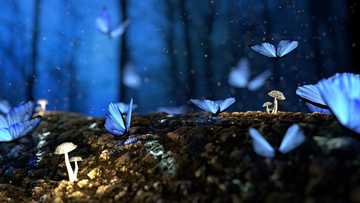Of Shadows and Spite: A Nation Addicted to Mockery, by Folorunso Fatai Adisa
Editor's note: In this piece, Folorunso Fatai Adisa writes about how mockery and online shaming have become common in Nigeria, warning that the growing culture of cruelty is harming our values, relationships, and sense of humanity.
We have become a people fluent in mockery. It is our new mother tongue, our social currency, our shared sport. We sharpen our tongues more than our minds. We kneel not to pray, but to gossip. At every turn, we hover like vultures, not circling wisdom or truth, but waiting to pounce on imperfection.

Source: Getty Images
When someone shines with ninety-nine measures of brilliance, we do not see light. We hunt for the one flaw, the smudge, the crack. And when we find none, we invent it. We name it humour. We cloak it as banter. We anoint it as “just a joke or cruise.” But make no mistake. It is cruelty in masquerade. It is spite given a standing ovation.
This is no longer the land of witty proverbs and measured silence. This is now a digital coliseum, where shame is spectacle and mockery is performance art. We are bullies in agbada, gossips with data plans, intellectuals who feast on scandal and call it enlightenment. Our humour is no longer healing. It is poisoned. It is the dagger we pass around, each laughing as we take our turn to stab.
I have walked through Glasgow, through London, through quiet cafés and bustling streets. I have seen men and women whose bodies would, in our own country, be reduced to punchlines. But there, they move freely, untouched by ridicule. They wear their weight, their difference, their scars, with dignity. And no one dares to wound them with even a lingering look. Not because perfection surrounds them, but because decency restrains the flawed.
There, the lesson is not taught in classrooms. It is carried in the air: silent, civil, constant. No one needs to say that it is wrong to mock another’s body. You know it because no one does it. You know it because your laughter recoils in your own throat before it leaves your lips. That is civilisation. Not the skyscrapers or the GDP, but the invisible moral boundaries that govern how strangers are treated.
But what do we do? A young Nigerian woman posts birthday pictures on TikTok. She is vibrant. Proud. Unapologetic. She smiles with the ease of someone raised to believe in her own worth. Then the comments begin. Then the vultures land. Two point three million views. Thirteen thousand comments. An orchestra of insults. Her joy becomes a public dartboard. Her body, a trending topic.
They mock her. They ridicule her. They dissect her existence. And they do it with laughter. With hashtags. With GIFs and slang. They dance on her dignity and call it entertainment. Body shaming has become our new folk dance, performed in the group chat, perfected on Twitter, choreographed for virality. We must ask ourselves, who have we become?

Source: Getty Images
You celebrate a win, and they belittle it. You remain silent, and they attack your quiet. You speak up, and they call it pride. You guard your joy, and they call it pretence. Nothing satisfies the Nigerian tongue anymore except the taste of another’s humiliation. And so we mock. We deride. We heckle. And then we laugh. But beneath that laughter is rot. Beneath the performance is pain.
This is not humour. It is evidence of a bruised national psyche. It is the symptom of a wounded people who bleed on anyone that dares to be whole.
So let us ask, and ask boldly. When did it become stylish to be unkind? When did cruelty become cultural capital? When did ridicule become our native grammar?
And what are we teaching our children? That to be relevant, you must be ruthless? That to be popular, you must pierce others with your words? That you are permitted to shame so long as you do it with style?No. A thousand times no.
We must reclaim what we have lost. We must return to the village square of dignity. We must rebuild the sanctuary of silence, where words are weighed before they are spoken. We must once again believe that kindness is not weakness, that respect is not obsolete, that speech is sacred.
True civilisation is not how fluently we insult each other. It is how gently we speak of those who cannot defend themselves. It is how we carry strangers in our mouths. It is whether we know when to be quiet.
Our elders used to say that the child who is not taught will burn down the house that raised him. We are that child now. And social media is the flame in our hands.
We really need to rise above this poverty of empathy. Let us unlearn the art of insult. We need to abandon the theatre of mockery. We need to remember what it means to be human.
Because people who laugh at the pain of others will one day mock their own downfall, and not even realise that the fire is in their own home.
Folorunso Fatai Adisa is a writer, communication specialist. He holds a Master’s degree in Media and Communication from the University of Strathclyde, Glasgow. He writes from Nigeria and the UK.
Disclaimer: The views and opinions expressed here are those of the author and do not necessarily reflect the official policy or position of Legit.ng.
Proofreading by James Ojo, copy editor at Legit.ng.
Source: Legit.ng






